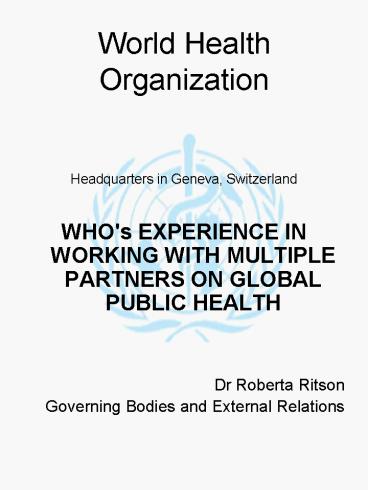World Health Organization - PowerPoint PPT Presentation
1 / 11
Title:
World Health Organization
Description:
Health is a key contributor to development, not merely a ... SARS, bioterrorism, tsunami, earthquake, avian flu, HIV/AIDS, floods, armed conflict, refugees ... – PowerPoint PPT presentation
Number of Views:7348
Avg rating:5.0/5.0
Title: World Health Organization
1
World Health Organization
- Headquarters in Geneva, Switzerland
- WHO's EXPERIENCE IN WORKING WITH MULTIPLE
PARTNERS ON GLOBAL PUBLIC HEALTH - Dr Roberta Ritson
- Governing Bodies and External Relations
2
WHO and Partnerships for Health
- The determinants of health are multisectoral
- WHO needs partners from across the sectors
- Multisectoral,multistakeholder
- partnerships
- We all have a stake in health
- Health is a key contributor to development, not
merely a beneficiary - The Internet is an important technology for
health
3
WHO is a stakeholder in the Internet
- Rapid global communication with partners,
dissemination of up-to-date information, data on
health - Rapid access to health crises, monitoring of
growing epidemics in countries - WHO's Strategic Health Operations Centre (SHOC
room) 24hour monitor - Online training and health learning
materials,exchanges/best practices - E- health initiative
- The Internet has changed the way
- WHO works
4
WHO's Constitution
- WHO's primary responsibility is to governments in
192 Member States - Member Governments are WHO's primary
stakeholders partners - Ministries of Health, Education, Development
Cooperation, Information and Communication,
Finance - Partnerships with local government
- city or regional authorities
- Public/ Private partner mix in health care
- Role of Civil Society partners
5
Who are WHO's partners?
- - Public Sector
- Governments in Member States
Assessed/Voluntary contributions - - Private sector
- Major corporations and business
enterprises - Foundations Bill and Melinda Gates
Foundation, Ford, Kellogg, Carnegie - - Civil society (NGO's)
- Red Cross, Medecins sans Frontieres,
OXFAM, consumers, community, church groups - Global health needs/crises
- mean new sources of funding,
- new partnerships/mechanisms
6
Who are WHO's partners?
- WHO's partners in United Nations system
- World Bank, UNDP, UNICEF, WTO, FAO
- Regional Development Banks
- Regional groups EU, AU, ASEAN
- Universities, research institutes, WHO
Collaborating Centres - Parliamentary associations
- Trade Unions
7
WHOs policy for private sector partnerships
- Ethics and the public good
- WHOs Guidelines for interaction with the private
sector - WHOs Committee on private sector relations
- Conflict of interest
- Vetting of private sector enterprises
- Image and business practices
- Limitations of private sector partnerships,
commercial interest
8
WHOs policy on relations with Civil Society
partners
- Vetting of NGOs
- their alliances sources of funding,
- vision statement, operating practices
- Ethics and the public good
- NGOs in official relations with WHO
- Medical/ scientific/ health professions
- NGOs in informal working relations
- local country level partners
9
Mechanisms for partnerships at WHO
- Forum/ Meeting of Interested Parties
- Donor and stakeholder agreements
- e.g. Polio Alliance WHO, UNICEF,
- Centers for Disease Control, USA,
- Rotary International, NGOs
- Networks, joint committees with
- UNICEF, WTO, UNDP, FAO, NGOs
- Private sector agreements
- e.g. pharmaceutical companies
- Globalization the Internet has changed the way
WHO works - WHO as Secretariat or member of consortium of
stakeholders - Official relations with NGOs/ civil society
10
Governance and Legal Issues for Partnerships at
WHO
- Use of WHO logo
- Legal and governance issues
- What kind of partnership agreement?
- Changing global context, growing health crises,
has forced new ways of working for WHO, more
rapid response, new mechanisms - SARS, bioterrorism, tsunami, earthquake, avian
flu, HIV/AIDS, floods, armed conflict, refugees - Flexible agreements governance structures,
networking, multistakeholder agreements - e.g. HIV/AIDS, Global Polio Alliance
11
WHO as a major player in the international arena
- WHO, as the specialist health agency of the
United Nations, has supra-national authority, but
needs global multisectoral partners - Health is a political and international affairs
issue - WHO works through multilateral partnerships and
networks to safeguard global public health - The Internet is an important tool for
International cooperation and multistakeholder
diplomacy

